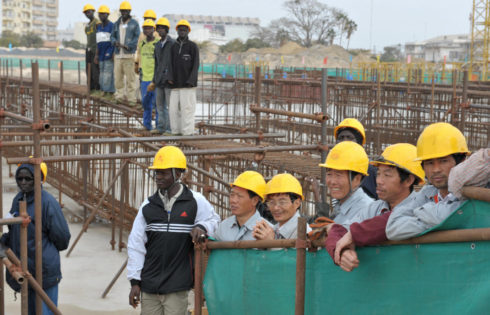
A new report is warning that China may be spying on African government officials from within their own buildings.
The report by the Heritage Foundation, a US-based conservative think tank, found that Chinese companies built at least 186 government buildings in Africa and 14 “sensitive intra-governmental telecommunications networks.”
These buildings include residences for heads of state, parliamentary offices, and police or military headquarters. The author of the report, Joshua Meservey, senior policy analyst for Africa at the Heritage Foundation, said the research does not prove there is spying going on at these buildings, but he believes the possibility should be explored.
“The Chinese government has a long history of all types of surveillance and espionage globally,” Meservey told VOA via Skype. “So we know this is the sort of thing they want to do, the sort of thing they have the capacity to do. And also, Africa is important enough to them to do it.”
Meservey noted that even private Chinese companies are “legally obliged” to help the Chinese Communist Party gather intelligence.
Chinese government response
During a May 22 news conference, Chinese Foreign Ministry spokesperson Zhao Lijian strongly denounced the report, saying it was filled with “lies, illusions and ideological bias.”
“We urge [a] certain think tank in the U.S. to spend more time and energy on assisting Africa with real actions instead of spreading lies,” Lijian said, according to the official transcript of his remarks.
“The African people have a fair judgment. Attempts to drive a wedge between the friendly partners of China and Africa will only lead to self-inflicted humiliation.”
Meservey said the idea for the report came from the 2018 accusation that China had installed listening devices in the African Union (AU) headquarters in Addis Ababa, Ethiopia. The findings, first published by the French newspaper Le Monde, alleged that servers in the AU headquarters were secretly sending data to a computer system in Shanghai each night between midnight and 2 a.m.
“The computer systems were delivered turnkey,” Le Monde wrote in 2018. “And Chinese engineers have deliberately left two flaws: backdoors, which give discrete access to all internal exchanges and productions of the organization.”
AU and Chinese officials denied the report by Le Monde. Kuang Weilin, China’s ambassador to the AU, called the charges absurd and said they were designed to undermine Sino-African relations.
But Meservey believes the AU spying may be just the tip of the iceberg. He said China’s motives for investing so heavily in building infrastructure for African governments is suspect because these projects generally are not profitable.
“For decades, a central element of China’s international diplomatic efforts has been cultivating strong relationships with senior African officials and giving them glitzy, brand-new government buildings,” Meservey said. “It is clearly a way of building favour with these governments. … These are designed as pieces of political influence.”
His report found that Chinese companies had built at least 24 African presidential or prime ministerial palaces, residences or offices and at least 26 parliaments or parliamentary offices.
Meservey said China might be looking to pick up information from third-party countries such as the US when its diplomats visit African countries. He said it might be interested in gathering financial data on African countries for future investments and gaining the upper hand in loan negotiations. China also may be looking to gather useful, personal information about African leaders.
“It’s possible to gather information on specific leaders, learn about their habits, their predilections, their financial situation,” he said. “Things that you could use to manipulate them or even to recruit them as an asset either through blackmail or just knowing how to tailor your pitch to them.”
-Observer

